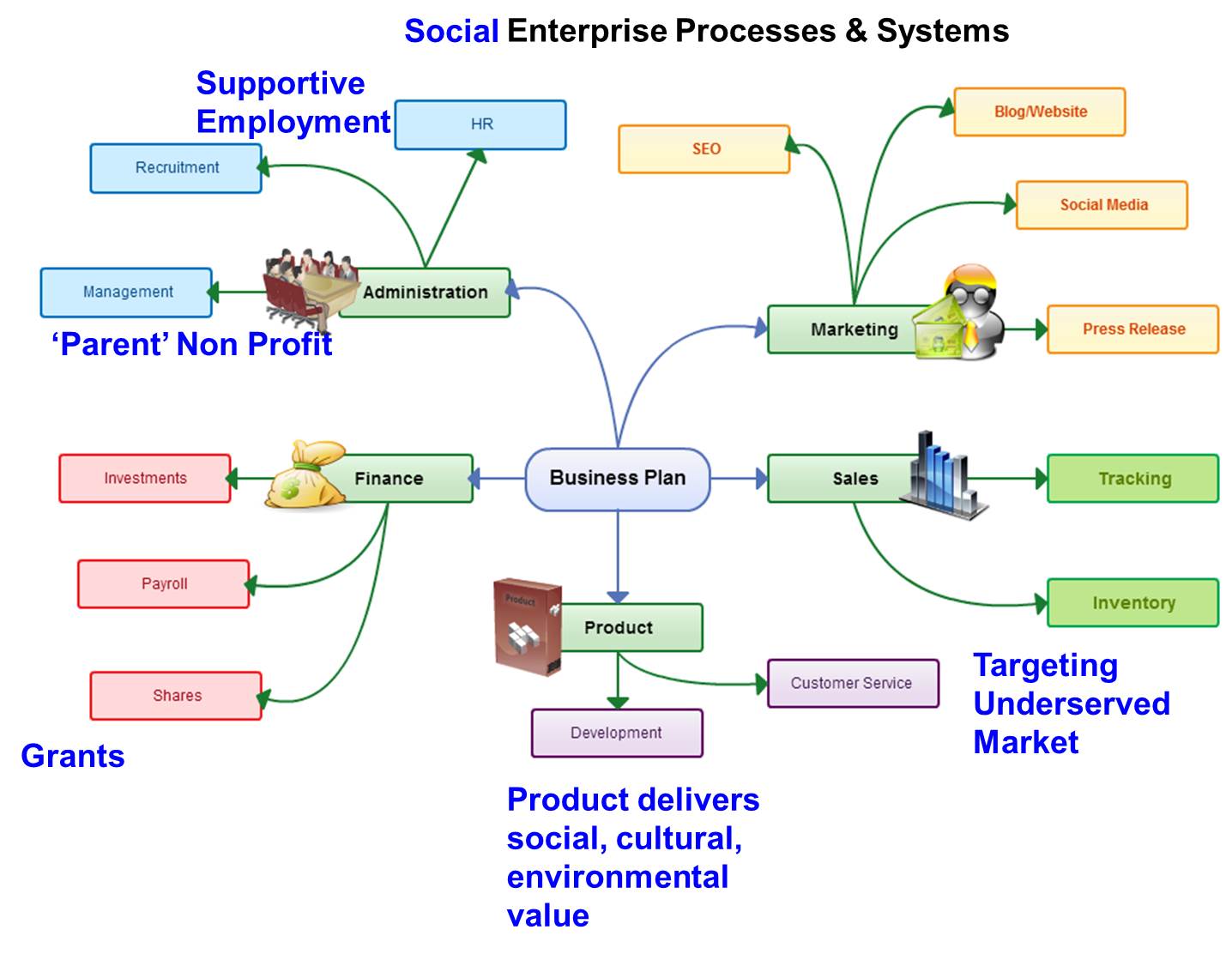Tracking impact measurement in social enterprises can come out of the basic process and system development that should naturally occur in any business. I recently advanced this notion in my presentation at the Social Enterprise World Forum last week, and have been thinking more about how this should be done. Here are some ideas.
Below is a typical diagram of typical systems and processes that are developed in an enterprise (I nabbed this from Google images the night before the presentation). I added in additional features that are unique to social enterprise in blue (not all apply to all enterprise, but many to most). Note that the blue text doesn't float, but is quite rooted in processes that are part of any business, and the subject of process development. Since process and system development is intrinsically linked with tracking, you automatically have the basis for impact tracking too! Most softwares solutions include great data tracking features automatically. The art is to select and set them up so that it addresses your expanded value creation as a social enterprise.

While business system develoment can get you core information about business performance and impact, you will also need do additional analysis that could involve supplemental data collection. Like business data, you need to analysis and use it to develop knowledge, insights and actions.
Here is a list of typical systems and how you could include tracking around impact.
Process/System | Including Mission Impact |
Human Resources Software: Talent Management/ Scheduling/ Payroll | If you provide targeted employment, use additional fields to capture information that is unique to these employees and helpful to understand the impact of their employment with you and your support.
Also some key standard features can be particularly useful, such as understanding absenteeism, retention rate, and position progression and skills development.
Track payroll of target employees uniquely. This can provide insight about their earning and income.
|
Accounting | Organize statements to provide insight into impact. For instance, group costs that relate specifically to supporting the mission aspect of your business.
Cost accounting in general can be very useful to developing your business.
|
Sales / Customer Tracking | If you are selling a unique product/service that provides a solution to a community need, be sure to track product sales uniquely if they fundamentally differ in likely impact.
If you are providing a product/service to an underserved community, tag and track these customers uniquely. You can calculate the subsidy you need to raise from regular market sales or from other sources. |
Customer Surveys | Include questions that relate to your mission – for instance baseline decision/behaviors that my evolve with their involvement with you. |
Suppliers | If you seek to purchase from particular supplies that carry more social/environmental value, ensure that you can tag these suppliers in your tracking so that you can calculate the impact of this decision.
|
Depending on what you do (for insance, providing supportive employment, producing an innovative product/service that addressess a community need; providing a product/service to an underserved community), different systems will be more appropriate to capture your impact. In choosing software look for options that have customizable fields and customizable reporting. Also look for features that enable you to easily export data, and for data to be in a format (like txt, xml) that can enable you to use the data easily. If you are capturing personal data and you want to consider a software vendor that stores data ‘in the cloud’ be sure to investigate the security and privacy guards around this data.
It is still important to start with what you want to ‘know and show’ about your mission impact, and articulate how you see that you enterprise creates impact. But when it gets time to looking at how you can track information, ground it in your systems.
As a final note, it is quite valuable to invest in system and process development and I've seen that this is often something that is put off. At a certain point you can’t do it all in your head! Also, systems set up for non-profit programs may not be appropriate for business needs. On the bright side, there are more and more software systems that are directed to small businesses and are easy to implement, and support to develop systems may actually be available by business management consultants at little or no cost (for instance, in the Vancouver area, JDQ Systems awards free support to non-profits including social enterprises.)
